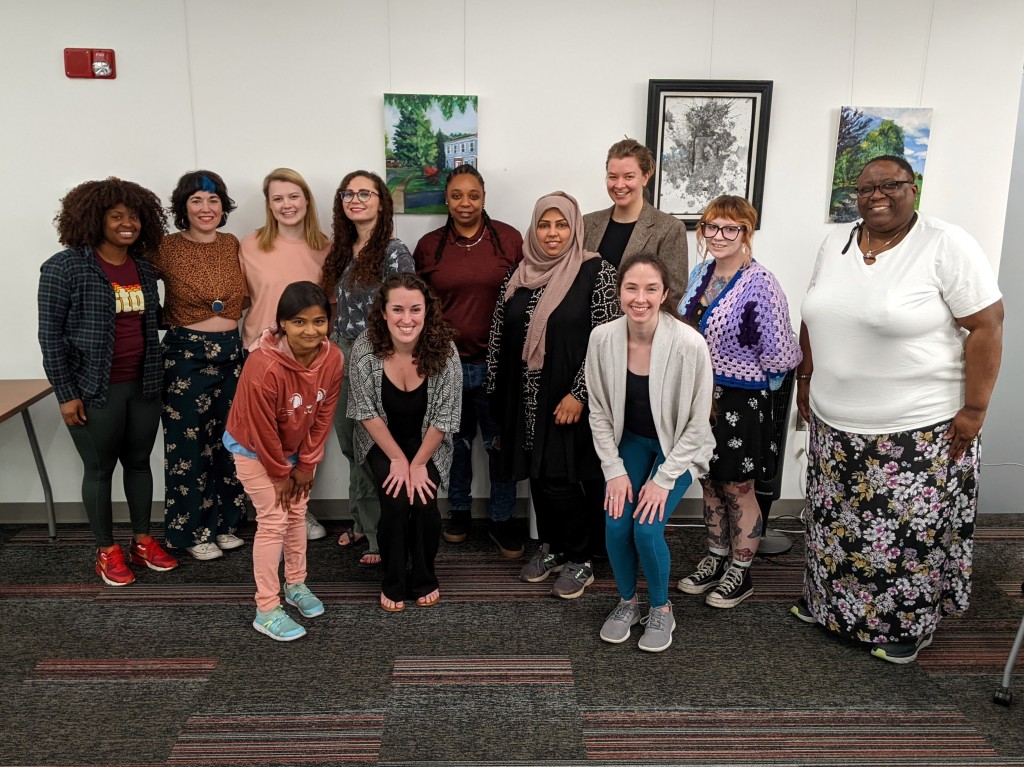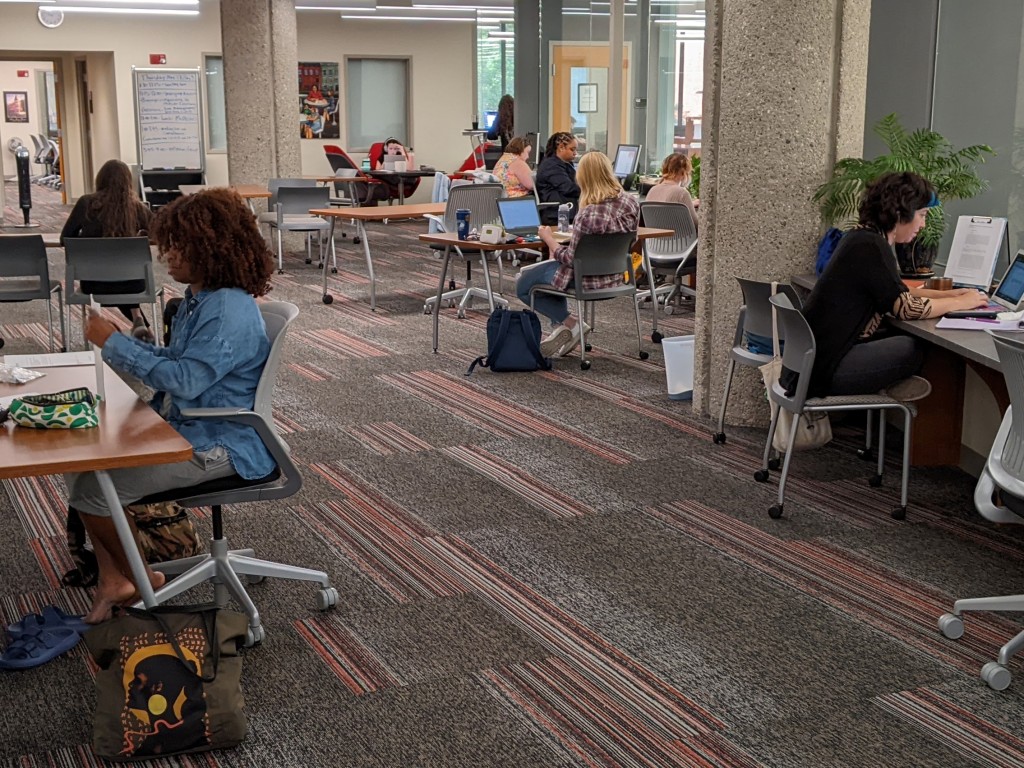Jameson Reid and Shelby Cundiff – Writing Consultants
Introduction:
No matter what your peers say about your writing, or even your professors, your writing is ultimately yours. You have the best ideas of what you want your writing to consist of. No one knows better than you the argument that you are trying to make and the effects you want your writing to have. However, many professors are pushing their students to do peer feedback, and are even implementing class time to work in pairs or small groups to look over each other’s work. At times, this will take place in person where you all can have a conversation about the work, and other times, you might read through each other’s work alone and send a document of your thoughts. Or, maybe you are with your friends and you are all working on the same assignment, so you all offer to read through each other’s work. Regardless, these are all considered forms of peer review. Although the writing is yours, there is nothing wrong with a second set of eyes on your work; your peers, who are probably going through the same things as you, are good people to trust. Peers don’t have to be experts on your topic or in the craft of writing, but letting someone with an outside view of your paper experience your writing can be valuable to you.
Using Peer Feedback (Jameson):
When writing, it is very easy to get stuck in your own head. The sentences that you write may start to lose any meaning for you, and your argument may become unclear to anyone except yourself. Feedback can help you see what your argument is and see the structures and patterns that may have formed unintentionally. You can see if your peers are noticing what you are doing in your writing. What is being communicated effectively and what isn’t? Suggestions for improvements may be useful, or they may not be. Trust in your reader but also trust in yourself. If a peer’s comments feel completely off or their suggestions go against what you want to do, then ignore it, but understand why you are ignoring it. Have good reasons for making decisions, and be confident in knowing why you decide to follow a suggestion or disregard it.
It also depends on the amount of peer reviewers you have. Some classes may have you work with a single partner, a small group, or the whole class may be workshopping your paper. You can look for shared opinions across your reviewers and you should be aware that it is likely that some of your reviewers may not be reading very closely or may not be particularly adept at giving feedback. If you have the opportunity to speak with your reviewers, then you can ask them to provide the feedback that is most useful to you. Ask them to describe their experience with different sections of your paper. Push them to try to identify why they don’t understand something. What specifically is in your paper that is causing the various reactions?
Giving Peer Feedback (Jameson):
As a peer reviewer often the best feedback you can give is to describe your experience when reading their writing. For an essay this can mean a few things. You can describe your understanding of the paper’s argument, identify the parts of the argument that you notice, and places that confuse you. You are giving your peer an outside perspective on their paper as someone who has not spent time researching and writing on the topic. Something that may be obvious to the writer, who is deeply entrenched in their subject, won’t be obvious to you and might need to be explained more. If you can find these moments then your feedback will be very useful to your peers. You can also question if your peer’s argument isn’t fully developed. Maybe there is a counterargument that they need to acknowledge. These comments however should always come with your understanding of what the argument is. Nothing is worse for a writer than them seeing criticisms of their argument that don’t make any sense to them.
In creative writing workshops, the feedback to give is fairly similar. Give your reaction to the text. This can include your emotional reaction, your takeaways, or what you think the meaning is. Then, if you can, try to describe what elements of the writing created this meaning. How effective are these elements? Is there something the writer can do to improve these elements? If you have suggestions or ideas, feel free to give them, but don’t feel like you have to if you aren’t sure. Describing your experience is something that anyone can do and will still be very useful to the writer. Also, remember that writing can be very personal, even in scholarly work. Peer feedback is not just criticism and suggestions for improvement. It should also be positive. Describe what you really enjoyed, what was really effective. If you find their argument or topic interesting, let them know. Then when you have to be critical, be only critical and not insulting. Don’t be afraid to use peer feedback to your advantage; it could be helpful to you.
What Peer Feedback Has Done For Me (Shelby):
As someone who has always been a good writer and confident in her abilities to write papers, I never really understood the point of peer review… That was until the first year of undergrad, which hit me like a train. Partially, I thought peer review made me weak, as if I couldn’t write without needing validation from my classmates or friends. The other part of me was just stubborn, and continuously told myself I didn’t need it. However, I began to realize that there is nothing wrong with help, and a second set of eyes is now a must-have for me. During my first year at Centre College, the classes and writing assignments were harder, and combining this with a newfound independence, I learned quickly that I needed to use the resources around me to better myself. Thankfully, I was surrounded by friends who also loved writing, and enjoyed reading through my work, telling me what they liked, didn’t like, or what needed to be worked on. This process continued throughout my undergraduate experience, and has continued to be important to me as I have started graduate school.
My senior spring, I decided to take a risk and take a creative writing class, where a big part of our grade was based on peer review. This class was arguably the most diverse class I had ever been in, and for that reason, I learned more than I ever had from reading my classmate’s works about their experiences and their readings of my work. For example, the first short story I wrote was about a girl who was struggling with her identity as a lesbian, and was therefore struggling to come out to her family and friends. While I am not a member of the LGBTQIA+ community myself, I had a peer reader who was, and assured me that I was doing a good job of conveying the experience of many queer individuals. Thinking back throughout my entire undergraduate experience, the difference in opinions, thoughts, and experiences of both my classmates and friends made me a better writer, thinker, reader, and overall person. With all of this being said, I want to encourage you to be okay with peer feedback, whether it be in your classes or just within your friend group. Just because someone tells you their opinion doesn’t mean you have to listen, but, you might find after reflecting on it, that it will help you in the long run. Other people may be more experienced than you in some areas, and there is nothing wrong with that. Writing is hard. You will never know everything. So, take advice from your peers, and do it sooner than I did. I promise, it helps.
















